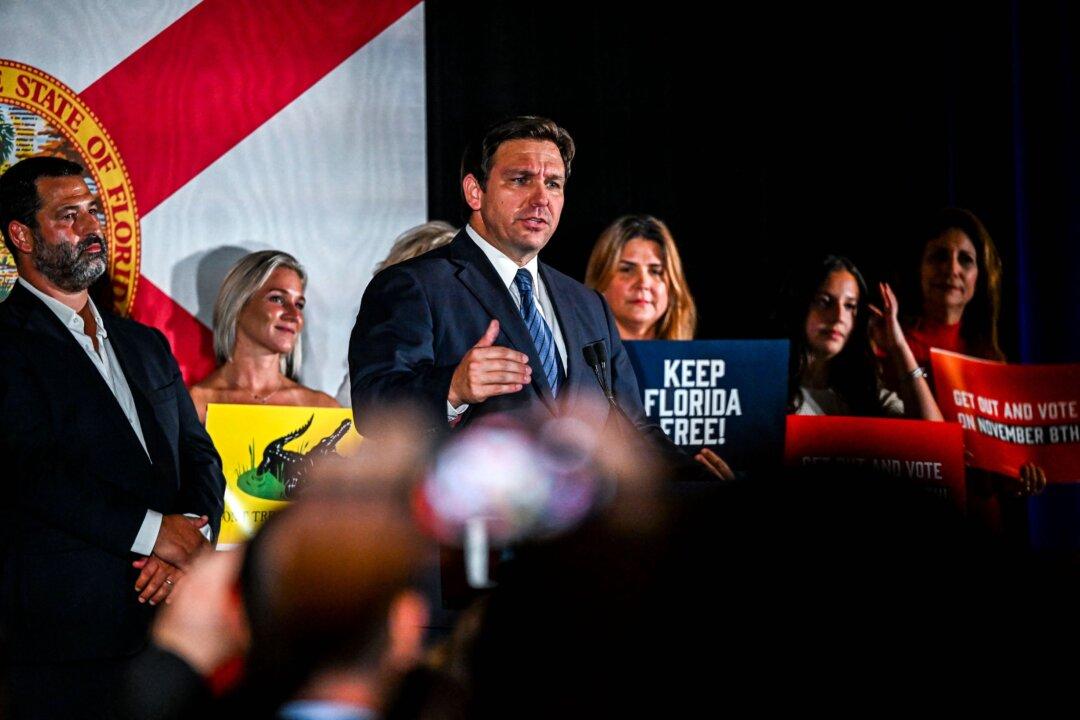LAKELAND, Fla.—Gov. Ron DeSantis was not challenged by a party rival in a Republican primary, so his name was not printed on any Aug. 23 ballot in any of Florida’s 67 counties.
But his name was all over elections across the state in the form of endorsements, particularly for candidates in local school board elections.
DeSantis, seeking reelection to a second term amid speculation about his presidential ambitions, endorsed 30 school board candidates across 19 counties.
According to Florida’s Secretary of State office, 19 won their races outright, and six are advancing to November runoffs.
The 30 endorsed candidates pledged to support the “DeSantis Education Agenda,” which limits discussions of sexuality or gender identity, bans “critical race theory” and “woke ideology,” and aims to make the school system “about education, not indoctrination.”
In breaking with century-long tradition, DeSantis became the first Florida governor to endorse and aggressively campaign for local school board candidates in traditionally nonpartisan, sleepy summer affairs of little note beyond immediate zip codes.
But the governor, who championed the state’s Parental Rights in Education law—dubbed “Don’t Say Gay” by detractors—is spearheading the nationwide parents’ rights movement in Florida.
DeSantis told reporters after his Aug. 23 cabinet meeting that school board endorsements have been the province of unions and progressive groups that dominate the education industry.
He said his entry into these elections is on behalf of a constituency with little representation—parents.
“This is new, particularly for Republicans, because (it) had basically been unions would back candidates, and that would be it,” he said. “Now I think more parents are interested, some of our voters are interested.”
DeSantis is also targeting school boards because several defied his prohibitions on mask mandates and other restrictive COVID-19 measures.
According to the National Conference of State Legislatures (NCSL), only Pennsylvania, Louisiana, and Alabama have required partisan school board elections. Tennessee lawmakers approved a measure last year that allows school board candidates to list party affiliation on ballots.
North Carolina and Georgia, meanwhile, allow local officials to determine if elections, including school board, will be partisan.
Florida voters passed a constitutional amendment in 1998 making school board elections nonpartisan. State lawmakers in recent years have made several attempts to get another ballot measure before voters to repeal that 25-year-old amendment.
Proponents say it is naïve to think school boards are apolitical and that voters can see ideological preferences in candidates that identify their political leanings despite being allegedly, officially nonpartisan in the performance of their duties.
Wyoming state Sen. John Kolb (R-Rock Springs) told The Epoch Times on Aug. 11 that making elections partisan is more honest and helps voters know what candidates stand for.
Political designations “matter because they say who you are,” Kolb said, and that’s important when electing candidates to “do day-to-day management of resources.”
Opponents say school boards should be insulated from party politics and lament what they call the politicization of local elections, especially as battlegrounds for whatever culture war the parties are picking at each other over at the moment.
DeSantis’ actions present a “dangerous precedent,” critics say, and one that is being bulldozed into existence despite most Floridians wanting to keep school board elections nonpartisan.
Brevard County School Board Member Jennifer Jenkins, regarded by many as a possible lieutenant governor for Democratic gubernatorial candidate Charlie Crist, in an Aug. 19 press conference said bills to make school board elections partisan fail because it is an unpopular notion to most Floridians.
“And now we see Ron DeSantis do what he can to circumvent that fact in order to make these races as partisan as possible,” she said.
Crist, who defeated Florida Agriculture Secretary Nikki Fried in their Aug. 23 Democratic gubernatorial primary and will take on DeSantis in November, issued his own slate of seven endorsements for school board candidates in July.
Crist’s seven endorsed school board candidates won two races, lost two, and three are bound for runoff elections in November.
There were three elections in which DeSantis- and Crist-backed candidates went head-to-head on Aug. 23, including two in Hillsborough County.
Crist-endorsed Hillsborough School Board incumbent Karen Perez defeated DeSantis-backed Aly Legge. Hillsborough PTA President Damaris Allen, supported by Crist, and DeSantis-backed incumbent Stacy Hahn finished in a draw and will face each other in a November runoff. In Indian River County, DeSantis-endorsed Jacqueline Rosario defeated Cindy Gibbs, Crist’s choice.
DeSantis’ endorsements did particularly well in Miami-Dade, Duvall, and Sarasota counties, where his anointed candidates swept all three available seats, changing the board dynamics and signaling the end of nonpartisan school board elections is rapidly nearing in Florida.





